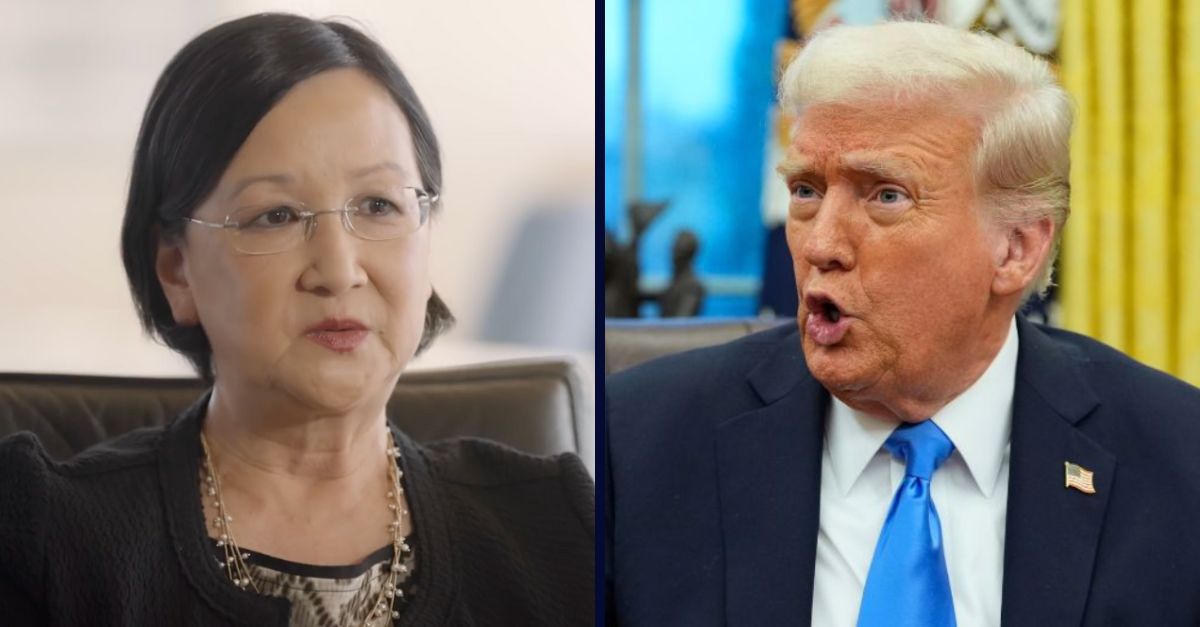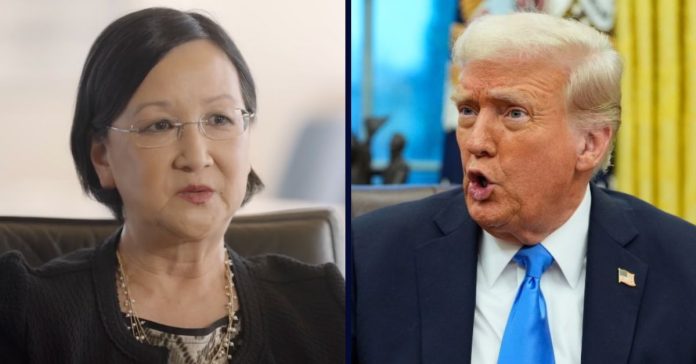
Left: U.S. District Judge Dolly Gee speaking in an interview with the National Asian Pacific American Bar Association (NAPABA/YouTube). Right: President Donald Trump speaks with reporters in the Oval Office at the White House, Tuesday, Feb. 11, 2025, in Washington, D.C. (Photo/Alex Brandon).
A federal judge in California has shot down an attempt by the Trump administration to scrub away the government”s 28-year-old Flores Settlement Agreement, which calls for court-mandated oversight on the treatment of immigrant children in federal custody.
U.S. District Judge Dolly Gee issued a 20-page order on Friday, keeping the 1997 agreement in place as Justice Department lawyers “fail to identify any new facts or law” that warrant its termination “at this time,” according to the Barack Obama appointee.
The administration had previously tried terminating the Flores agreement in 2019 at the end of Donald Trump‘s first term, but was unsuccessful then, too. Gee reportedly called a hearing last week on the matter “deja vu” as the government tried propping up similar arguments.
“The court remains unconvinced,” Gee wrote in Friday’s order. “There is nothing new under the sun regarding the facts or the law.”
Love true crime? Sign up for our newsletter, The Law&Crime Docket, to get the latest real-life crime stories delivered right to your inbox.
Under the Flores Settlement Agreement, immigrant children must be held at “state-licensed” facilities — treated properly and humanely — before being released into the custody of family members or guardians “as expeditiously as possible,” per Gee’s order. The settlement is named after Jenny Lisette Flores, a 15-year-old detainee who sparked a class-action lawsuit to be filed in 1985.
The Trump administration recently argued that the Flores agreement was no longer needed because Congress had approved legislation to help deal with the issues the settlement addressed. It also claimed that government agencies had implemented practices and standards to ensure youths were being treated properly.
“The legal basis for the agreement has withered away,” DOJ lawyers argued in a May 22 motion for relief. “Congress enacted legislation protecting UACs [unaccompanied alien children], and the agencies promulgated detailed standards and regulations implementing that legislation and the terms of the FSA,” the lawyers said, blasting the agreement as an “intrusive regime” that has “ossified” federal immigration policy.
“The legal and policy landscape has also changed beyond recognition,” they added.
Gee noted Friday how she had heard this all before.
“These improvements are direct evidence that the FSA is serving its intended purpose, but to suggest that the agreement should be abandoned because some progress has been made is nonsensical,” the judge blasted.
“Incredulously, defendants posit that DHS need not promulgate regulations containing an expeditious release provision because ‘this Court has interpreted [expeditious release] to apply to accompanied children,'” Gee explained. “But ‘the FSA was intended to provide for prompt release of unaccompanied children.’ This is plainly incorrect and ignores the rulings of at least three separate courts.”
Gee concluded her order by saying it was ultimately the Trump administration that “continues to bind itself to the FSA by failing to fulfill its side of the parties’ bargain.”
Lawyers for immigrant children named in the class action complaint that spurred all this have said Trump’s second term has seen similar violations of the Flores agreement that have been alleged in the past.
“In CBP facilities across the country, including in cases documented by class counsel in New York, Maine, Illinois, Ohio, Arizona, Texas, and California, plaintiffs report being held for days and sometimes weeks in restrictive, traumatic conditions,” the lawyers said in a June 17 motion to enforce the FSA. One parent, whose allegations were included in the motion, described how they and their child were held at a facility where “the rooms have hard walls, like cement, and there is a window facing the hall but you cannot go out or see the sun,” per the motion.
“We are never allowed to go out,” the parent said. “The children keep telling us, ‘This is not America.’ They feel imprisoned and confused. They are seeing the sun for the first time in this interview room. They both ran to the window and stared out, and my son asked, ‘Is that America?'”
The plaintiffs’ lawyers accused the Trump administration of wanting to be released from the settlement “not because they have complied with and will continue to observe its fundamental principles, but because they want the flexibility to treat children however they wish,” according to the June motion.
DOJ officials did not respond to Law&Crime’s requests for comment Sunday.

